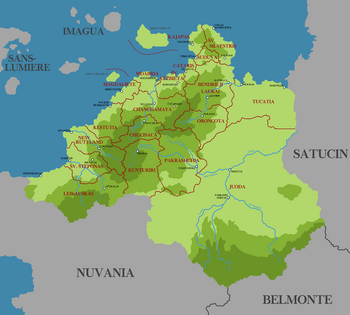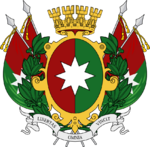Aucuria: Difference between revisions
No edit summary |
|||
| Line 81: | Line 81: | ||
==Etymology== | ==Etymology== | ||
[ | The etymology of "Aucuria" is disputed. Folk etymology relates the name to a supposed incident involving {{wp|užkariautojas}} [[Jurgis Leikauskas]] during the [[Ruttish conquest of Aucuria|Ruttish conquest]] of the region; following the conquest of a [[Cutinsua|Cutinsuan]] town, Leikauskas supposedly rededicated the town's temple as "the altar of {{wp|Jesus Christ|Jesus Soter}}", and proclaimed the surrounding land to be "the land of the altar of Jesus Soter" ({{wp|Lithuanian language|Ruttish}}: ''Jėzaus Soterio aukuro žemė'') to Ruttish explorers; this was subsequently reduced to "the land of the altar" (''aukuro žemė'') and, eventually, simply "Aucuria" (''Aukurija''). Historians agree that the story about Leikauskas is likely apocryphal, but "''aukuro žemė''" is attested to in maps from the late 1500s and early 1600s, lending credence to the hypothesis. If this hypothesis is true, Aucuria's name would ultimately derive from the {{wp|Proto-Indo-European language|proto-Eucleo-Satrian}} "''h₂ewg-''", literally "to grow" or "to increase", but more metaphorically "to honor" or "to exalt", via the old Ruttish ''auka'' (modern Ruttish ''augti''). | ||
Some scholars reject the ''aukuras'' hypothesis as too improbable, noting that ''aukuras'' is used far less in Ruttish than the more-common ''altorius'', and argue that it is more likely that the country's name derived from a native term. Most scholars in this camp argue that "Aucuria" derived from the {{wp|Quechua language|Runanca}} ''awqa'', literally "hostile" or "enemy", possibly given to Ruttish užkariautojai by the indigenous population and then unknowingly adopted by the former group as an appellation for the country; some, however, propose a link to the Runanca and {{wp|Aymara language|Kirua}} term ''awkisuyu'', roughly translatable as "the principality" or "the territory". Critics point out, however, that these hypotheses struggle to explain how ''awqa'' or ''awki-'' became "Aucuria". | |||
Proposals of an etymological link between Aucuria and the name of the [[Arucian Sea]] are heavily debated. | |||
The term "Aucuria" was first applied officially to the region in 1621; before this point, Aucuria had been formally known as the Colony of New Ruttland from 1538 to 1543 and the Colony of New Ruttland and Cutinsua from 1543 to 1621. | |||
==History== | ==History== | ||
Revision as of 20:08, 3 December 2020
This article is incomplete because it is pending further input from participants, or it is a work-in-progress by one author. Please comment on this article's talk page to share your input, comments and questions. Note: To contribute to this article, you may need to seek help from the author(s) of this page. |
Aucurian Republic Aukurijos Respublika Awkuriya Republika Ripublika Aukuriya | |
|---|---|
| Motto: Libertas omnia vincit Liberty conquers all | |
| Anthem: Aucurian name here TBD | |
 Political map of Aucuria | |
| Capital and largest city | Kalnaspilis |
| Official languages | Ruttish |
| Recognised regional languages | Runanca Kirua |
| Demonym(s) | Aucurian |
| Government | Federal constitutional parliamentary republic |
| Žygimantas Barauskas | |
| Petras Uspelevičius | |
• Speaker | Sulislova Petraitytė |
| Legislature | Saeimas |
| Independence from Cislania | |
• Declared | 1785 |
• Recognized | 1794 |
• Current constitution | 1980 |
| Area | |
• Total | 1,098,581 km2 (424,164 sq mi) |
• Water (%) | tbd |
| Population | |
• 2020 estimate | 44,223,510 |
• Density | 27.511/km2 (71.3/sq mi) |
| GDP (PPP) | 2015 estimate |
• Total | $695.149 billion |
• Per capita | $15,719 |
| GDP (nominal) | 2015 estimate |
• Total | $12.615 billion |
• Per capita | $7,069 |
| Gini (2015) | high |
| HDI (2015) | high |
| Currency | svāras (₺) (AKS) |
| Date format | dd/mm/yyyy (CE) |
| Driving side | right |
| Calling code | +53 |
| ISO 3166 code | AK |
| Internet TLD | .ak |
Aucuria (Ruttish: Aukurija), officially the Aucurian Republic (Ruttish: Aukurijos Respublika; Runanca: Awkuriya Republika; Kirua: Ripublika Aukuriya) is a sovereign state in Kylaris. Located on the Arucian coast of Asteria Inferior, Aucuria borders Nuvania to the west, Belmonte to the south, and Satucin to the east, and shares sea borders to its north with Imagua and the Sabanas. Its capital and largest city is Kalnaspilis.
The earliest evidence of human habitation in Aucuria dates back to 12,500 BCE. The Pativilkas civilization, which existed from 3,000 BCE to 1,500 BCE, was the first civilization in Asteria Inferior and one of the cradles of civilization in Kylaris. In the following 2,700 years, a litany of subsequent cultures developed, such as the Kiljakoljas, Piura, Tirakvas, and Kulkinčas cultures. The Runanca and Kirua appeared in the 1200s; a series of wars between the two resulted in the establishment of the League of Five Cities, or Cutinsua, by the Runanca in 1344; this polity ultimately came to control much of northern Aucuria. Ruttish explorers first arrived in 1538, and established control over the region in 1543. As the economy of colonial Aucuria shifted from the mining of precious metals towards cash crop agriculture, the area became increasingly populated by Euclean immigrants.
After the conquest of Ruttland in 1721, Aucuria was transferred to Cislanian control. Cislania attempted to impose upon the colony's mostly-Ruttophone population, which provoked widespread discontent; after several decades of rising tensions, Aucuria declared independence in 1785. The ensuing Aucurian Revolution ended in 1794 with the signing of a treaty confirming its existence as an independent republic. Initially a liberal presidential republic, the country slipped into dictatorship under President Fridrikas Dabrauskas until his assassination. A subsequent return to liberal republican governance lasted until the 1880s, when Aucuria's defeat in the War of the Arucian led to the Aucurian Civil War. The country was occupied by the Entente for much of the Great War, but an organized resistance force aligned with the Grand Alliance was able to liberate the country during the closing months of the war. After the war, a democratic government was briefly reestablished before being overthrown in a 1949 military coup. The ensuing military regime lasted until 1980, when it was overthrown in the Velvet Revolution and democratic governance was once again reestablished.
Aucuria encompasses a variety of biomes and terrain, including tropical rainforests along the Juoda River, large stretches of savanna known as pakraščiai, the highlands of the Vaskaranas Mountains, and the alpine tundra of the South Asterian Range. As much of the country's south is dominated by the western reaches of the Sythe Rainforest and the South Asterian Range, most of the country's population lives in the north. Aucuria is home to diverse wildlife, and for this reason is often listed as a megadiverse country.
Aucuria has a population of 44 million people as of 2020; this population is ethnically and racially diverse and includes populations of Euclean, creole, indigenous Asterian, Bahian, Rahelian, and Coian origin. Solarian Catholicism is the predominant religion in the country, though the country's history and ethnic makeup have resulted in a diverse array of syncretistic practices within the Solarian umbrella. Minority faiths in the country include Amendist and Brethren Sotirianity, Atudism, Irfan, Zohism, Badi, and Tenkyou. The country's official and main spoken language is Ruttish, but a significant number of indigenous Aucurians continue to speak native languages such as Runanca and Kirua, which have some degree of official recognition.
A developing country, Aucuria nonetheless boasts a high score on the Human Development Index and a diversified economy. The country's economy has long been based heavily on the export of agricultural products (such as coffee, sugarcane, cacao, citrus, pineapples, bananas, soybeans, corn, potatoes, and tobacco), meat and fish, minerals (including copper, gold, silver, tin, zinc, and iron), and forestry; however, the country also has substantial light and heavy industrial sectors, which account for roughly a third of the country's GDP, and has seen substantial and rapid growth in the service and tourism sectors in recent decades.
Since the Velvet Revolution, Aucuria has been a federal parliamentary republic, and is widely regarded as having successfully constructed a thriving multiparty democracy after decades of political turbulence and dictatorship; however, the country continues to suffer from issues of economic and ethnic inequality. The President of Aucuria, currently Žygimantas Barauskas, acts as the country's head of state while the Chancellor, currently Petras Uspelevičius, acts as the country's head of government. Aucuria has a unicameral parliament, the Saeimas, and an independent judiciary headed by the Supreme and Constitutional courts. The country is a member of the Community of Nations, the Organization of Asterian Nations, and the Asteria Inferior Common Market.
Etymology
The etymology of "Aucuria" is disputed. Folk etymology relates the name to a supposed incident involving užkariautojas Jurgis Leikauskas during the Ruttish conquest of the region; following the conquest of a Cutinsuan town, Leikauskas supposedly rededicated the town's temple as "the altar of Jesus Soter", and proclaimed the surrounding land to be "the land of the altar of Jesus Soter" (Ruttish: Jėzaus Soterio aukuro žemė) to Ruttish explorers; this was subsequently reduced to "the land of the altar" (aukuro žemė) and, eventually, simply "Aucuria" (Aukurija). Historians agree that the story about Leikauskas is likely apocryphal, but "aukuro žemė" is attested to in maps from the late 1500s and early 1600s, lending credence to the hypothesis. If this hypothesis is true, Aucuria's name would ultimately derive from the proto-Eucleo-Satrian "h₂ewg-", literally "to grow" or "to increase", but more metaphorically "to honor" or "to exalt", via the old Ruttish auka (modern Ruttish augti).
Some scholars reject the aukuras hypothesis as too improbable, noting that aukuras is used far less in Ruttish than the more-common altorius, and argue that it is more likely that the country's name derived from a native term. Most scholars in this camp argue that "Aucuria" derived from the Runanca awqa, literally "hostile" or "enemy", possibly given to Ruttish užkariautojai by the indigenous population and then unknowingly adopted by the former group as an appellation for the country; some, however, propose a link to the Runanca and Kirua term awkisuyu, roughly translatable as "the principality" or "the territory". Critics point out, however, that these hypotheses struggle to explain how awqa or awki- became "Aucuria".
Proposals of an etymological link between Aucuria and the name of the Arucian Sea are heavily debated.
The term "Aucuria" was first applied officially to the region in 1621; before this point, Aucuria had been formally known as the Colony of New Ruttland from 1538 to 1543 and the Colony of New Ruttland and Cutinsua from 1543 to 1621.
History
Prehistory and Pre-Asterian Aucuria
Conquest and colonial period
Independence
Geography
[tbd total rework]
Climate
[tbd total rework]
Environment and biodiversity
Politics
Governance
[tbd total rework]
Administrative divisions
[tbd total rework]
Largest cities
Foreign relations
Military and law enforcement
Economy
Agriculture
Forestry and mining
Industry
Commerce and finance
Science and technology
Media
Infrastructure
Transportation
Telecommunications
Energy
Tourism
Demographics
Ethnicity
[tbd total rework]
Religion
[tbd total rework]


